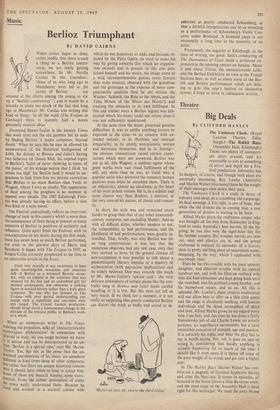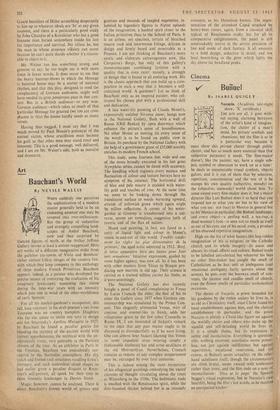Theatre
Big Deals
By CLIFFORD HANLEY The Unshaven Check. (Royal Lyceum Theatre, Edin- burgh.)—The Rabbit Race.
The Unshaven Cheek is a study in decay of industry and ideals in a crumbling old cooperage. Its final message, if I'm right, is one of hope; that while the old dreams die in coming true, a new generation of dreams is waiting to be born.
Alfred Marks plays the craftsman cooper who was brought all the way from Biddersley in Eng- land to make Australia's best barrels. In the by- going, he has also won the eight-hour day for his brother coopers. But wooden barrels are now out, steel and plastics are in, and the proud craftsman is reduced to caretaker of a factory slum (a pretty startling piece of naturalistic scene- designing, by the way, which I applauded with everybody else).
Then he has this trouble with his loyal spinster daughter, and different trouble with his cynical layabout son, and with his illiterate outback wife who did bird-imitations and kept going bush until she vanished; and his political young brother, and his burned-out mates; and so on. All this is splendid, Mr. Lawler's sheer creative exuberance will not allow him to offer us a thin little piece, and the stage is absolutely seething with human individuals and the dense atmosphere of place and time. Alfred Marks grows in my regard every time I see him, and this time he has done a fairly Stanislaysky job of old Charlie Lewis; no actorly postures, no superfluous movements, but a most irresistible evocation of strength, age and passion. It is certainly his night, and what the play has to say is worth saying. But, cor, it goes on and on saying it, considering that hardly anything is actually happening for so much of the time. I should like it even more if it threw off some of the pure weight of its words and got into a higher gear.
In The Rabbit flace Martin Walser has con- structed a pageant of German hypocrisy during and after the Nazi era. It comes in episodes, all situated in the forest above a little Bavarian town, and the open stage of the Assembly Hall is dead right for this technique. We meet the petty Home
Guard bumblers of Hitler scrambling desperately to live up to whatever ideals are 'In' at any given moment, and there is a particularly good study by John Chandos of a Kreisleiter who has a good humane man buried somewhere inside his lust for importance and survival. No villain he, but the man in whose presence villainy can occur because he can't quite decide whether it's reason- able to object to it.
Mr. Walser too has something strong and genuine to say; he too might say it with more force in fewer words. It does occur to me that the heavy hammer-blows in which the Message is battered home may be a matter of national rhythm, and that this play, designed to rend the complacency of German audiences, might well have needed its grim ponderous pace in that con- text. But to a British audience—or any non- German audience—which takes so much of that t articular Message for granted (we too are com- rliacent in this) the lesson hardly needs so many verses.
Having thus nagged, I must say that I was much moved by Paul Massie's portrayal of the eternal victim, whose crucifixion must become his guilt so that other men may stand erect and innocent. This is a good message, well delivered, and I am on Mr. Walser's side, both as moralist and dramatist.































 Previous page
Previous page